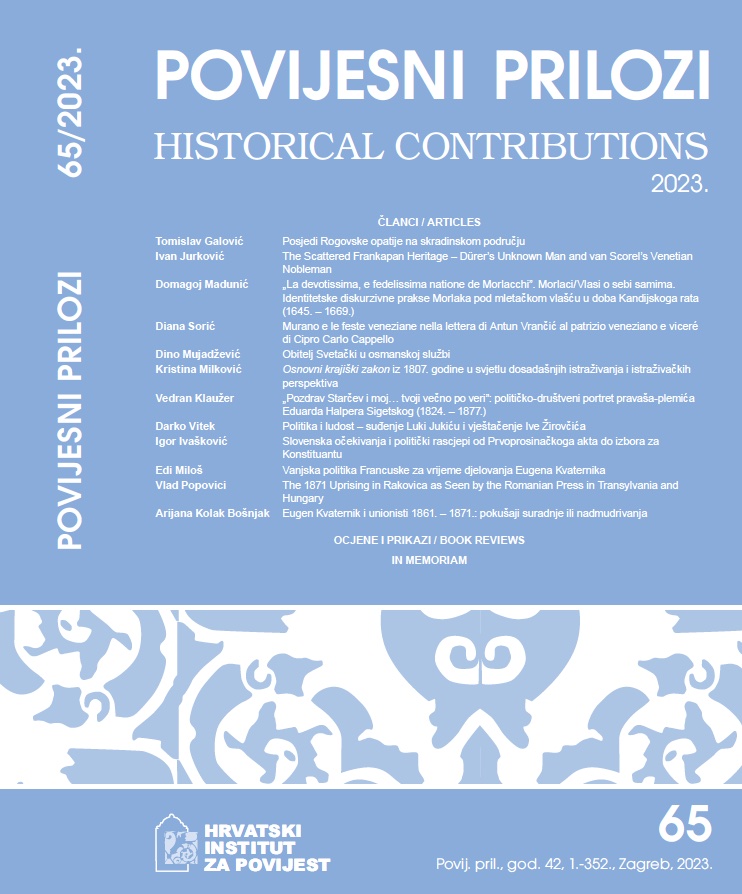The Basic Law of the Military Frontier from 1807 in the Light of Existing Studies and Research Perspectives
DOI:
https://doi.org/10.22586/pp.v42i65.27516Keywords:
Military Frontier, legal history, Basic Law of the Military Frontier, cooperative, Francis IAbstract
The Basic Law of the Military Frontier is one of the most important legal acts issued for the Croatian-Slavonic and Banat Military Frontiers. First published in 1807 in German, it was translated the following year into Croatian, specifically the Slavonian Štokavian-Ikavian literary idiom, and to the Slavic-Serbian language. The law is trilingual and written in three scripts: German printed script, Latin, and Cyrillic. Unlike the preceding comprehensive legal acts like the Statuta Valachorum from 1630 or the Militar Gränitz Rechten from 1754, the Basic Law of the Military Frontier did not exclusively represent state intervention “from above” through legal regulations but also incorporated customary law derived from the life of the frontiersmen, aligning with the contemporary understanding of the “spirit of the people.” Its third chapter, “Von der Haus-Communion,” is particularly notable, as it regulated the house cooperative (extended family) based on the idea of collective ownership, limited by the concept of military serfdom, labour, and consumption – which was a fundamentally different approach from half a century earlier. The law comprises the following parts: Einleitung, Erstes Hauptstück Von dem Rechte auf unbewegliche Güter, Zweytes Hauptstück Von dem Rechte der Gränzer, sich auf Gewerbe, Handel und Wissenschaften zu verlegen, Drittes Hauptstück Von der Haus-Communion, Viertes Hauptstück Von der militärischen Widmung der Gränzer, Fünftes Hauptstück Von der Gränz-Aerarial- und Gemeinde-Arbeit, Sechstes Hauptstück Von der Grundsteuer, and Siebentes Hauptstück Von der Industrie- und Schutzsteuer, encompassing a total of 155 legal articles. Under Emperor Francis I, the state committed numerous officers and officials at all levels of the command hierarchy to craft the law over several years through the work of multiple commissions. The objective was to create a legal framework aligned with the specific political context and local socioeconomic environment, reflecting “the spirit of the people” as articulated in the law. The legal text aimed to achieve two goals: to provide a legal definition of private property following the particularities of the Military Frontier, as was the case in the neighbouring and rival Napoleonic France as well as the Inner Austrian lands, where the General Civil Code of the Military Frontier dynamized the socio-economic relations; and to preserve the region’s territory and organization for purely financial reasons. Despite these ambitious goals, the relatively modest outcome of this courtly legal project paradoxically contributed to this region's impoverishment and economic decline in the 19th century.
Downloads
Published
How to Cite
Issue
Section
License
Copyright (c) 2023 Authors and journal

This work is licensed under a Creative Commons Attribution-NonCommercial 4.0 International License.







